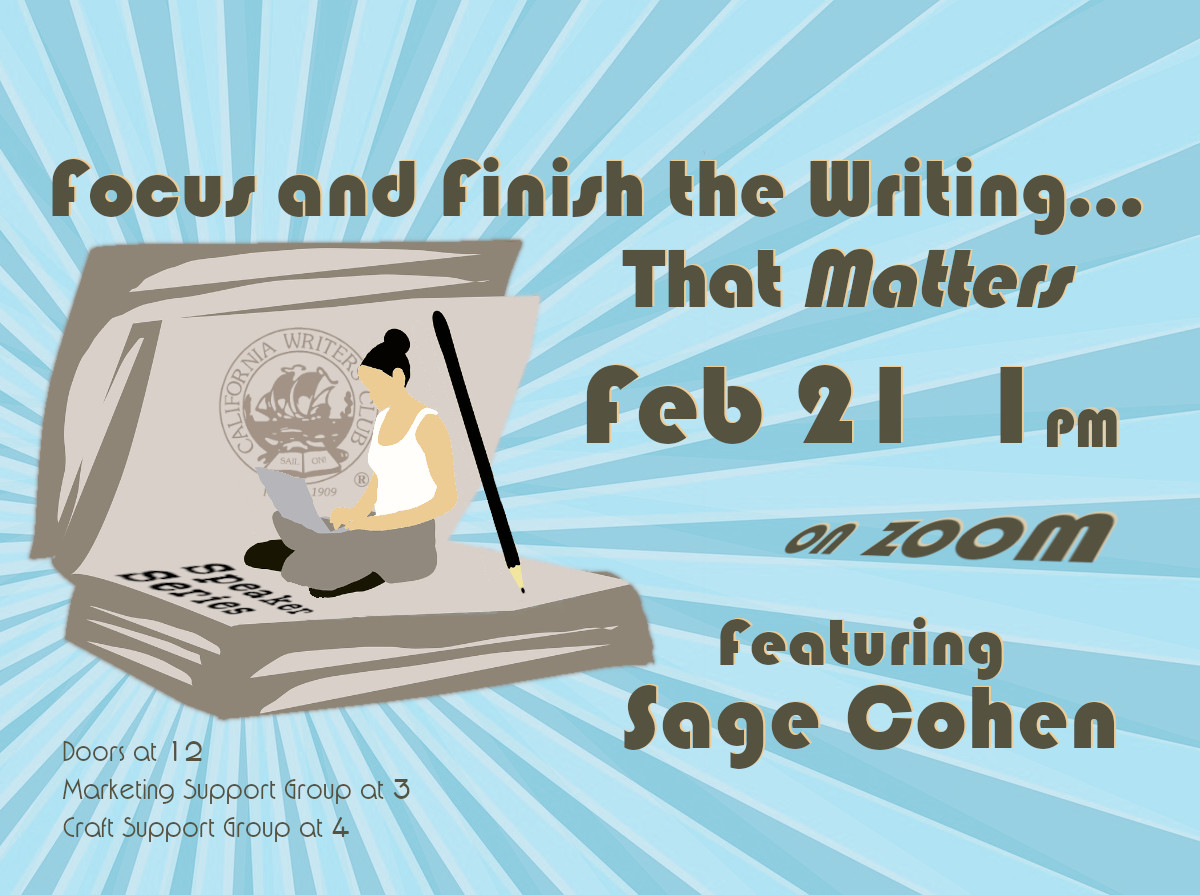An Interview with Sage Cohen, Keynote Speaker
Meet Sage Cohen, Author of Fierce on the Page and The Productive Writer
Sage Cohen is convinced that there are many ways to be productive in your writing. The key is to have fun experimenting with different methods until you find the one that inspires you. In her workshop with CWC-Berkeley this month, Sage Cohen will be discussing her top 10 strategies that will help you complete your project. In this interview, Sage shares her thoughts on writing habits during times of change, persevering through waning enthusiasm, and balancing parenthood with creativity.
Five Questions for Author Sage Cohen
Do you believe people have to write every day? Why or why not?
Sweetcakes, you can do just exactly what you want to.
I believe each of us is our own, best expert, and there is no one-size-fits-all formula for writing productivity. It is our responsibility and privilege as writers to determine what moves us forward and what holds us back.
For some people, writing every day is hugely accelerating. But others write very effectively in fits and spurts! Cheryl Strayed, for example, describes her process as binge writing.
I always encourage writers to experiment with ways to inspire and sustain writing – then repeat whatever works.
How can writers stay productive during times of social and economic anxiety (such as right now during Covid?)
I’m going to say two contradictory things here. The writing life is full of paradoxes.
First, writing productivity does not always have to be our priority. In times of uncertainty, I think it’s most important to do whatever we need to do to feel as safe and secure as possible. Once the basics of food, clothing, and shelter are handled, we have a foundation for creative work.
And at the same time, writing can be a potent medicinal practice to get us through the hard stuff. Even in the greatest chaos and disruption, many of us can and must write.
I invite you to welcome whatever comes as manna for your literary life. If you meet fear, anxiety or uncertainty, write into it. See where it leads you, and what it has to teach you about yourself, your characters, and your craft.
Practically, life disruption can be quite challenging. Yet, when we have to think and act differently, this can be surprisingly beneficial in the writing life. I like to play with ways to make obstacles opportunities. Chances are good, for example, that you have at least one additional hour/week that was previously dedicated to some activity outside your home. Make the loss a gain by repurposing the time you spent socializing, volunteering, carpooling your kids or commuting to work for your writing.
In COVID times, you may have far too much or too little solitude, and this can be tricky. Find ways to reinvent the kind of context that works best for you to write. If you need privacy but are surrounded by family members, you could sit in a closet with noise-canceling headphones. If you need community but live alone, you could hang out on a zoom with your favorite writers and work in each other’s company.
Don’t expect what worked last year – or even last week – to work now. Be flexible. Get creative. Find ways to stay motivated and accountable. And do the writing that really matters.
How do you know when to persevere with a project and when your lack of enthusiasm is an indication that you should change direction?
When enthusiasm flags, I encourage writers to consider why. It’s possible their priorities have changed. Or maybe they’ve reached the limit of their understanding of the piece. But often, they are meeting fear of some kind. The good news is that fear can actually help fuel your writing when navigated intentionally.
If you’re not sure how to diagnose your own resistance, you can always change direction briefly and see where that leads you. I’ve finished and published stories that sat untouched for 20 years. Something in me needed to incubate more fully before I could see (and write) what those pieces needed from me.
Don’t be afraid to experiment with stopping, starting, pivoting, resuming. It’s all practice in service to your discovery journey. You’ll learn as you go how to read and act upon your own signs. Along the way, you will hone your instincts for your writing process.
You’re a Mom. How do you balance writing with responsibilities you can’t avoid or de-prioritize, such as family?
I align them! For example, I wrote most of Fierce on the Page one hour per evening while sitting in my son’s room with him as he fell asleep. By linking a reliable writing habit to a daily parenting practice, I created a solid system for producing work.
Motherhood has also taught me that margins are mighty and every scrap of time I have matters. Waiting at a red light, walking the dog, arriving early at an appointment, I capture images, record phrases, plot what’s next. It is amazing how much can happen in just 10 minutes.
In those high-drama moments when I feel I’ll never have enough time, taking a lifetime perspective helps calm me down. There are seasons of life when parenting takes every ounce of energy we’ve got. And eventually, our kids become more independent and need us less.
Gratitude is the connective tissue for all of this. I’m so grateful for my son. I’m so grateful for my writing practice. Investing my attention in these truths helps ensure that I’m dedicating my resources to what I value most.
Your latest book talks about being ‘fierce on the page.’ What does it mean for a writer to be ‘fierce?’
Fierce writers are relentlessly self-responsible. They are willing to risk and stretch and experiment and fail and keep going. They hold their writing journey as an evolutionary process—so that even the struggles are generative.
Fierce writers discover how to come into alignment with their authority, leverage their instincts, and honor their rhythms to become the truest instrument of their craft. If they don’t like the way the story ends, they keep writing.
Meet Sage Cohen at this Month’s Meeting on February 21st
You can meet Sage at this Sunday’s event, when Sage shares her 10 strategies for focus and productivity in writing. Learn more about the event here.
Get your Tickets for Sage Cohen’s Focus and Finish the Writing that Matters
Event Schedule
$5 for members, $10 for guests, free tickets available*
Community
12:00 Club leaders check-in
12:30 Welcome and networking with members & guests
Program
1:00 p.m. Club Announcement
1:30 p.m. Member Spotlight: Kazue Watanabe
1:45 p.m. Featured Speaker: John Curl
2:30 p.m. Book Sales & Networking
Tickets include admission to our online craft and marketing support groups, now meeting Thursdays. more info here.
See meetings for more info.
*Virginia Prentiss Equity Fund donors and emerging writers in need of a boost, please use the promo code ‘VP’ at checkout for a free ticket. Learn more.

Sally Srok is an author, speaker and coach for executive women. Her first book, The New Jew: An Unexpected Conversion detailed her journey from being a lapsed Midwestern Catholic to a Reform Jew in New York. She is seeking representation for her new memoir A Modern Divorce: Keeping My Husband and Rediscovering Myself


